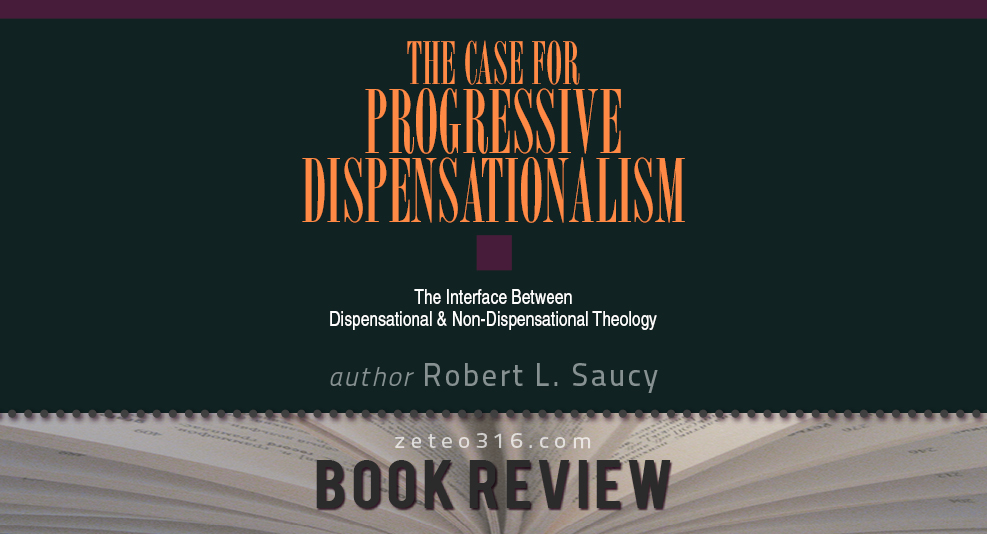The Case for Progressive Dispensationalism, The Interface Between Dispensational & Non-Dispensational Theology* by Robert L. Saucy. *affiliate link
Published by Zondervan (336 pages).
It was on strong commendation from Dr. Michael Vlach (Has the Church Replaced Israel?) that I finally decided to read “The Case for Progressive Dispensationalism.” Meanwhile, Classical Dispensationalists will likely have three main grievances with Saucy’s PD book:
1) Silence on rapture timing (Not the focus of the book)
2) The “already-not-yet” aspect of the Davidic Covenant (Needs to be challenged)
3) The inauguration of the New Covenant to Jewish and Gentile believers in the church (I agree with Saucy)
The controversial “Complementary Hermeneutics” of PD is thankfully absent from the book.
Note that some Classical Dispensationalists hold that the church is currently enjoying certain aspects of the New Covenant – though this is a debated point. On the other hand all CDs reject that Christ is currently sitting on David’s Throne in any sense. For those interested in further exploring these issues, I highly recommend Ron Bigalke’s “Progressive Dispensationalism: An Analysis of the Movement and Defense of Traditional Dispensationalism.” *affiliate link
This is not a book commending PD – it is a strong critique of the system.
On page 9 of his Preface, Saucy writes:
Instead of a strict parenthesis that has no relation with the messianic kingdom prophecies of the Old Testament, many dispensationalists now acknowledge the present age of the church as the first-stage partial fulfillment of these prophecies. Israel and the church are no longer viewed as representing two different purposes and plans of God, as some earlier dispensationalists taught; they are now seen as sharing in the same messianic kingdom of salvation history. These changes have obviously brought more congruence between dispensationalism and non-dispensationalism at many points.
However, aside from his New Covenant and Davidic Throne positions, Dr. Saucy fails to bring any congruence between the dispensational and Covenant Theology camps. His book has far more affinity with classical dispensationalism. Proponents of Covenant Theology will find little comfort there. The reason is that Saucy systematically demonstrates why biblical promises made to national Israel cannot be fulfilled in the church or Christ (Fulfillment Theology).
This is the great strength of Saucy’s book and why Dr. Vlach recommended it.
Replacement Theology reinterprets and tweaks straightforward biblical statements regarding future Israel and applies them to a predominantly Gentile church. Supersessionism, for example, demands the adoption of Typology and Symbolism to defend against the weight of contrary evidence in numerous OT passages (e.g., Jer 31:31-37).
Supersessionists routinely point to several NT texts which allude to the OT in an attempt to show how these promises have been reinterpreted. See for example Peter’s citation of Joel 2 in Acts 2:17ff and James’ use of Amos 9:11-12 in Acts 15:13-18. Saucy adeptly refutes the Typological & Symbolic premises as well as the NT-OT reinterpretation examples.
Dr. Saucy responds to the usual supersessionist objections. For example, are there insurmountable problems associated with Christ’s announcing the nearness of an Israelitish kingdom prior to the Cross? What about the possibility of Israel’s repentance, along with the Gentiles, prior to the Cross?
Saucy writes that the idea of incorporating Israel into the church does not logically require that the church becomes a “new Israel” (pp 208-209). In fact Saucy does not necessarily hold that it should be “incorporated”. He argues that even if this was the case it does not require a denial of continued distinctions and that the question is not crucial to understanding Israel’s prophecies. Continuing on he says that if the word “church” is the name of the body of Christ, “or the final eschatological people of God throughout eternity, then it would be correct to include Israel in the church.” But he then makes the intriguing observation that “one never finds the term church applied to those beyond the present age.”
It has been my experience that it’s practically impossible to dissuade a committed supersessionist. The problem doesn’t lie in weak arguments presented by dispensationalists. This book refutes that notion. Rather, the issue is the determined commitment to a theological tradition adopted by the supersessionist over plain biblical revelation. The dispensationalist rides with the flow of the text whereas the supersessionist has to alter its course.
Despite the PD views I cautioned about earlier, The Case for Progressive Dispensationalism is a must-read book for anyone wishing to understand the future and distinct roles for redeemed national Israel. It is a perfect companion for Michael Vlach’s “Has the Church Replaced Israel?”
Purchase The Case for Progressive Dispensationalism: !
Disclosure: This link is an affiliate link meaning, at no additional cost to you, we may get a commission if you make a purchase. Thanks for your support in this way!
Read our Full Disclosure policy here.
The Case for Progressive Dispensationalism, The Interface Between Dispensational & Non-Dispensational Theology
Contents
Part I) Introduction
1) The Crucial Issue Between Dispensational and Non-Dispensational Systems
Part II) The Present Age and Old Testament Prophecy
2) The Abrahamic Covenant
3) The Davidic Covenant
4) The Kingdom
5) The New Covenant and the Salvation of the Gentiles
Part III) The Church in Salvation History
6) The Church and the Revelation of the Mysteries
7) The Baptism with the Spirit and the Metaphors of the Church
8) The People of God, Israel and the Church
Part IV) The Place of Israel
9) The Old Testament Prophecies about Israel
10) The Pauline Prophecies about Israel
11) Other New Testament Prophecies
12) The Future Purpose of Israel
Indexes


